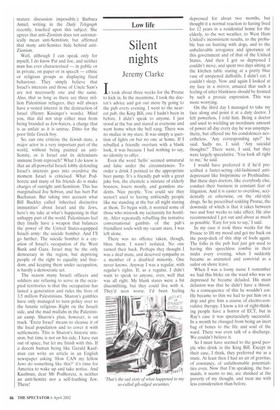Silent nights
Jeremy Clarke
It took about three weeks for the Prozac to kick in. In the meantime, I took the doctor's advice and got out more by going to the pub every evening. I went to the nearest pub, the King Bill, one I hadn't been in before. I didn't speak to anyone. I just stood at the bar and stared at everyone and went home when the bell rang. There was no malice in my stare. It was simply a question of lights on but no one at home. If I rebuffed a friendly overture with a blank look, it was because I had nothing to say, no identity to offer.
Even the word 'hello' seemed unnatural and false under the circumstances. To order a drink I pointed to the appropriate beer pump. It's a friendly pub with a great juke box, the clientele a mixture of elderly boozers, losers mostly, and gormless students. Nice people. You could see they weren't used to having unfriendly people like me standing at the bar all night staring at them. To begin with, it worried some of those who mistook my taciturnity for hostility. After repeatedly rebuffing the tentative conversational gambits of the pub's friendliest souls with my vacant stare, I was left alone.
There was no offence taken, though, bless them. I wasn't isolated. No one turned their back, Perhaps they thought I was a deaf mute, and deserved sympathy as a member of a disabled minority. One never knows. Anyway I was a regular, with regular's rights. If, as a regular, I didn't want to speak to anyone, ever, well that was all right. My blank stares were a bit discomfiting, but they could live with it. They'd seen worse. I'd been feeling depressed for about two months, but thought it a normal reaction to having lived for 12 years in a residential home for the elderly, to the wet weather, to West Ham United's inconsistent results, to the probable ban on hunting with dogs, and to the unbelievable arrogance and ignorance of this government and of that of the United States. And then I got so depressed I couldn't move, and spent two days sitting at the kitchen table staring at a pretty blue vase of unopened daffodils. I didn't eat, I couldn't sleep. Now and again I looked at my face in a mirror, amazed that such a feeling of utter blankness should be fronted by such a prosaic expression. This was more worrying.
On the third day I managed to take my face along and point it at a duty doctor. I felt powerless, I told him. Being a doctor and used to wielding an inordinate amount of power all day every day he was unsympathetic, but offered me his condolences nevertheless. 'Any corresponding ups?' he said. Sadly no. I said. 'Any suicidal thoughts?' There were, I said, but they were largely speculative. 'You look all right to me,' he said.
I would have preferred it if he'd prescribed a faster-acting old-fashioned antidepressant like Imiprimine or Prothiadine. But these days doctors, like everybody else, conduct their business in constant fear of litigation. And it is easier to overdose, accidentally or otherwise, on the old-style drugs. So he prescribed sodding Prozac, the downside of which is that it takes between two and four weeks to take effect. He also recommended I got out and about as much as possible. 'Easy for you to say,' I said.
In my case it took three weeks for the Prozac to lift my mood and get me back on the poop-deck of this ship of fools again. The folks in the pub had just got used to having this speechless zombie in their midst every evening, when I suddenly became as animated and convivial as a sailor on shore leave.
When I was a loony nurse I remember we had this bloke on the ward who was so depressed he became deluded. His main delusion was that he didn't have a throat. As a consequence of this he wouldn't eat. He became so thin we had to put him on a drip and give him a course of electro-convulsive therapy. I know a lot of right-thinking people have a horror of ECT, but in Ray's ease it was spectacularly successful. In a month he changed from being an inert bag of bones to the life and soul of the ward. There was even talk of a discharge. We couldn't believe it.
So I must have seemed to the good people who drink in the King Bill. Except in their case, I think, they preferred me as a mute. At least then I had an air of gravitas, of constancy, of unfathomable potentialities even. Now that I'm speaking, the barmaids, it seems to me, are shocked at the poverty of my thought, and treat me with less consideration than before. It






























































 Previous page
Previous page